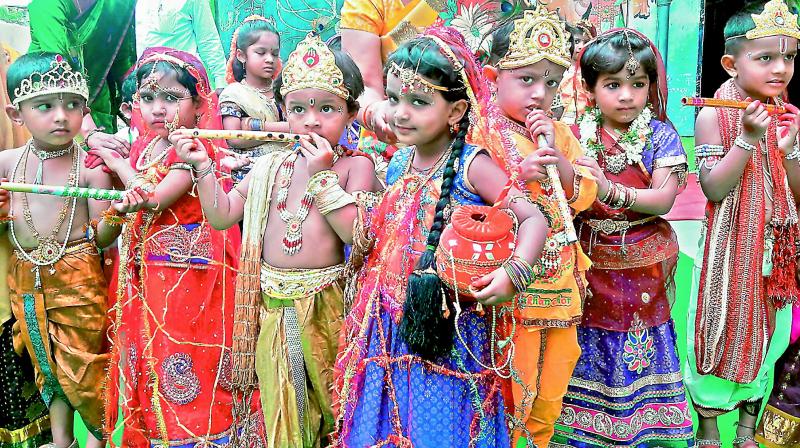Ringing in a colourful Janmashtami

Krishna Janmashtami is here. One of the oldest and most widely celebrated festivals in the country, it marks the birth of Lord Krishna. During this auspicious time, temples are decorated and Krishna idols are adorned with new clothes and ornaments. People celebrate by attending satsang meetings and singing bhajans. Little children also add charm to the festivities by dressing up as Lord Krishna. In some parts of India, the popular ‘dahi-handi’ ritual, wherein people make a human pyramid to break a pot hanging at a great height, is held. Hyderabad too has its own special ways of observing the festival with people from different communities coming together to bring Lord Krishna home.
Energetic celebrations
“Janmashtami is one of the biggest religious festivals in the world. I usually go to my mother’s place where the festival begins before dawn and extends all day until midnight. Friends and family come and we do kirtan and sing bhajans. The deity of Krishna is decorated with beautiful clothes, garlands and others decorations. He is also bathed with a variety of auspicious liquids; the ceremony called the Abhisheka, takes about an hour to perform. A variety of sweets are made and also a few friends call us to watch a drama of the whole episode of Krishna Leela. It’s really a very lively and colourful festival buzzing with energy.”
— Madhu Jain from the Deepshikha Mahila Club.
Garba and prayers
“On Janmashtami morning, we prepare idols of Yashoda with mud and clay and decorate it. Later in the afternoon, everyone gathers together and plays the Garba next to the idol. At night, after dinner, we have some theme-based cultural programmes of devotional songs. Finally at midnight, we do pooja wherein Lord Krishna is given a bath and then placed in a jhula (swing). The person who has taken the responsibility to perform the rituals gets dressed up as Vasudev and also dresses a child in the family as Krishna. And then the story of Krishna’s birth is narrated. This is then followed by the final arti.”
— Nitin Patel, civil engineer
Fasting and feasting
“I’ve always been enamoured by the decorations that are synonymous with Krishnashtami. Rice flour is used to design feet from the entrance of the door to the temple area of the house, symbolising that the baby Krishna has walked into our home and blessed us with his presence. The day starts with a customary head bath, followed by a whole day of fasting. Just around the time of sunset, the actual puja begins wherein the entire family comes together, freshly bathed once again, and in clean clothes. The naivedyam that we offer on this day is quite special because unlike during other festivals, during which we make a full meal, this time it’s all about sweets. An assorted platter of venna, neyyi, milk and curd, along with nine varieties of sweets are given as offerings to the Lord. This day proves to be a day of feasting for the kids in the house. The elders then eat plain food that has no spices, not even salt! And towards the end of the day, the idol of Krishna is placed in a cradle in the temple area where we swing him a little, symbolising that we have lulled him to sleep. That marks the end of the celebrations.”
— Padma J., teacher
A festival of colours
“Janmashtami is celebrated with people fasting the whole day, singing devotional songs of love for Krishna, and keeping a vigil into the night. We all decorate the cradle of Lord Krishna with lights, flower and colours. After Krishna’s midnight hour of birth, the statue of Krishna is washed, clothed and then placed in a cradle. Abhishekam is done. We break our fast by sharing food and sweets, followed by a dinner party and playing with colours inside the building complex.”
— Harsh Ojha, businessman
Swinging the cradle
“Lord Krishna’s birth anniversary is celebrated with zeal and faith. It is an auspicious day for us and we celebrate it by singing bhajans and decorating Lord Krishna’s cradle with flowers. We even fast for the day and offer prayers to the lord.”
Disha Trivedi, homemaker

